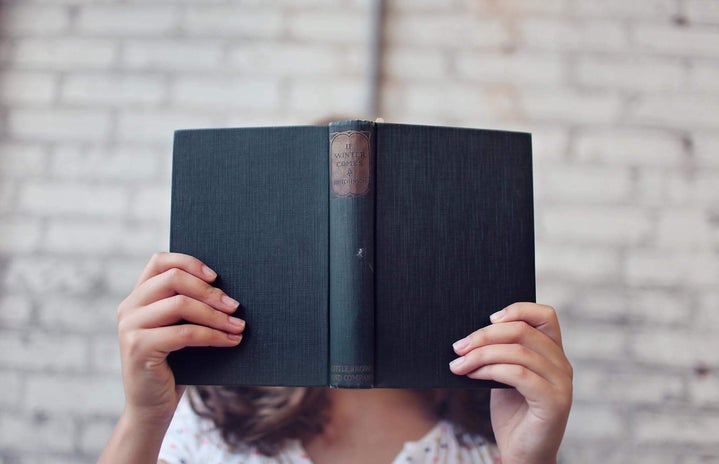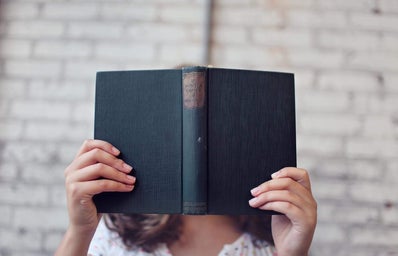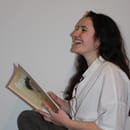A list of interesting facts about me:
- the smell of new books makes my mouth literally water
- I could, with the addition of food and water, live in a bookstore and be perfectly content for the rest of my life
- I currently have $153 worth of Chapters gift cards in my wallet
- there is exactly one (1) thing I am certain I would spend my money on if I won the lottery and that would be buying a bookshop
All of these facts have been consistently true about me since the age of about 4, when I started reading bedtime stories to myself because I knew it would be unfair to put either of my parents through the time commitment of reading exactly how many books I wanted to before going to bed. They’ve travelled with me everywhere, even in my dreams—a week ago I had a dream where I was talking to my younger, five-year-old self, and the only thing I distinctly remember about the conversation is that she was incredibly excited because her mom (my mom) (our mom?) was taking her to the bookstore that day. My love of books is the only constant truth in my life and the only thing I am sure of at any moment of any day. What has changed, though, in ways I can’t quite grasp or rationalize, is how often I read and what I turn to in my free time.
I was probably around 15 when The Decline started. Before that, I was consuming books at the pace of a paper shredder—trips to Chapters meant one and a half books started and finished in one sitting, two if I didn’t spend the first half hour wandering every aisle picking up a stack 12 books high to bring with me; car rides never, ever came without a book in hand; books were generally consumed on a weekly if not daily basis, sometimes more than one at once. But gradually, at a pace so sneaky and slow that I didn’t even notice myself until much later, the books dwindled. I forgot to pick up a book before getting into the car, I scrolled on my phone instead of reading during the five minutes of teeth-brushing, I let the books on my desk pile up. I can’t trace it back to any one source; 15 meant Grade 10 which meant more homework, but 15 also meant being more tired, and it also meant the draw of The Internet (I was late to the social media game, but like so many others, my main social justice education came from the online world, and who else ended up scrolling some tumblr site for hours, eyes lighting up at 1 a.m. learning about the pro-choice movement or the spectrum of LGBTQ+ identity?) and of The Netflix.
None of those reasons alone could have been enough to draw me away from my one true love, but the combination of sleep deprivation, stress, and the endlessness of the online world could be deceptively potent. By the end of high school, I was more educated, more tired, and suffering from long-term separation with books.
Don’t get me wrong, I was still doing the bookstore visits, doing the book-buying, and, incidentally, re-reading the Harry Potter series. But it seemed that life had taken a toll on me, and I, in true Rumpelstiltskin fashion, had sacrificed my first-born to stay afloat. Reading for pleasure became a rare treat, and even when I had the time (or didn’t have the time but was wasting it anyway), I didn’t always turn to a book to fill it.
Frankly, I was ashamed of the way I’d changed, but also confused as to how exactly it happened. So I took to Twitter, as any serious researcher looking for an answer does, and conducted a highly scientific poll. The poll asked past/present bookworms to answer whether they: a) find they don’t read as much/with the same passion as they did as a kid and, if yes b) what they’re doing instead of reading (options being: sleeping, schoolwork, Netflix, scrolling on social media. After 24 hours and a whole 35 votes (my online presence is about as strong as it was in the days before I had social media), the results were overwhelmingly in agreement with a), at 80% “Yes,” with an almost even split between the four offered alternate activities.
A quick Google search told a similar story; apparently this thing I’m experiencing is an actual, real, researched concept! That was all very reassuring (it’s not just me! I’m not the problem!), but the reasons for this epidemic all pretty much played the same millennials-and-technology tune—teens stop reading because they’re devoting more time to screens, kids have shorter attention spans, the new age of adults have been conditioned to sit through an article length at most, etc. etc. I’m not going to disagree with any of these statements, because I’ve now reached the age (ah, 19, the age of enlightenment) where I’ve taken off my rose-tinted glasses when viewing the wonders of social media and can see it for what I believe it truly is—something complex, a combination of being an excellent communication/sharing/connection platform of epic tech innovation proportions, a toxic environment for vulnerable groups, and a purely imaginary scale by which we all measure the worth of ourselves and our lives. But I also think the issue of the reading decline is more complex than that too.
Every person I’ve spoken to and all those people who voted in my poll didn’t just consider themselves casual readers from the beginning—they were bookworms, people who read all the time, loved books more than anything, couldn’t go anywhere without one. But what’s more important is that these people still love books more than anything; they still spend hours in bookstores, they still cry at the sight of special edition covers of their favourite books (or maybe that’s just me?), they still live and breathe for that nothing-like-it feeling of getting caught in a book universe. These are the kinds of people that wouldn’t just drop their books because the next best thing came along, so my guess is it has to be something more than technology and short attention spans.
If you’ve made it all the way through this, irrelevant personal details and all, just to figure out the answer to the question in the headline, I’m sorry to disappoint. I can’t give you a single answer to a question that applies to probably millions of people, all with their own experiences and reasons (sidenote #30281: imagine if every researcher and professor used THAT line to conclude their lectures and papers!). But I can tell you that if you love books but haven’t made time for them in the past few years, it’s not the end of the world. Reading is lovely and amazing and relaxing and riveting and ultimately very good for you as a thinking, feeling human being—I don’t need to tell you that!—and if you can manage to fit it in, you certainly won’t regret it. Who wouldn’t give anything to go back to their nine-year-old selves, reading all day without a care in the world and having their habits funded by willing parents? But sometimes life gets the best of you, and maybe not-reading-as-much-as-I-used-to is just another part of it, like learning to pay taxes and owning candles. So read a book, or don’t, or think about how much you love reading books for a few minutes after finishing this article and then go back to scrolling. I won’t judge and nor should you.
With love,
A fellow bibliophile (I felt like I had to use THE most pretentious book-loving term in existence at least once in this article so that you all can take me just a little less seriously than you already do)


